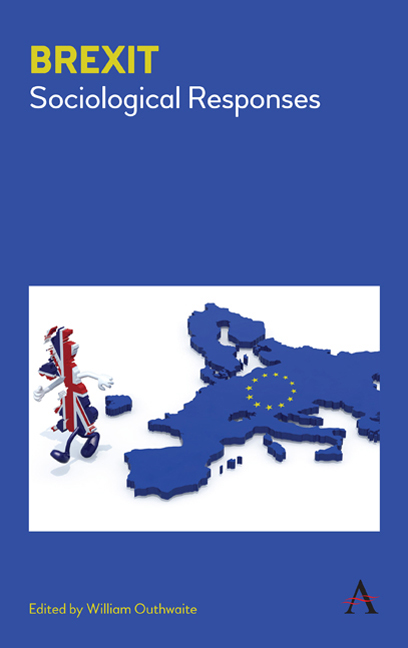Book contents
- Frontmatter
- Contents
- Preface
- Section 1 HOW DID IT HAPPEN?
- Section 2 THE POLITICS OF BREXIT
- Chapter Five Populism, Nationalism and Brexit
- Chapter Six A Tale of Two Constitutions: Whose Legitimacy? Whose Crisis?
- Chapter Seven Locating Brexit in the Pragmatics of Race, Citizenship and Empire
- Chapter Eight Globalization, Nationalism and the Changing Axes of Political Identity
- Chapter Nine A Divided Nation in a Divided Europe: Emerging Cleavages and the Crisis of European Integration
- Section 3 PROSPECTS FOR/ AFTER BREXIT
- Notes on Contributors
- Index
Chapter Eight - Globalization, Nationalism and the Changing Axes of Political Identity
from Section 2 - THE POLITICS OF BREXIT
Published online by Cambridge University Press: 10 January 2018
- Frontmatter
- Contents
- Preface
- Section 1 HOW DID IT HAPPEN?
- Section 2 THE POLITICS OF BREXIT
- Chapter Five Populism, Nationalism and Brexit
- Chapter Six A Tale of Two Constitutions: Whose Legitimacy? Whose Crisis?
- Chapter Seven Locating Brexit in the Pragmatics of Race, Citizenship and Empire
- Chapter Eight Globalization, Nationalism and the Changing Axes of Political Identity
- Chapter Nine A Divided Nation in a Divided Europe: Emerging Cleavages and the Crisis of European Integration
- Section 3 PROSPECTS FOR/ AFTER BREXIT
- Notes on Contributors
- Index
Summary
From the time of the French Revolution, mass politics has revolved around two core conflicts: that between preferences for more or less economic inequality, and that between conservative, authoritarian values and liberal ones. The main divisions among political parties in most countries fit into this frame, but we have become accustomed to seeing the former, raising issues of redistributive taxation, the welfare state and the role of trade unions as the senior partner. In Western Europe, if not in the United States, this has become even more the case as organized religion, the main historical carrier of social conservatism, has declined in importance.
This situation is challenged by the growing prominence of a chain of partly associated, partly quite independent, forces: economic globalization, immigration, refugees and the assertion of Islamic identities, which includes terrorism as its extreme. Together these reassert the old struggle between authoritarian conservatism and liberalism. Many people feel that everything familiar to them is being threatened, that they are being confronted with decisions, cultural artefacts and the presence among them of persons, all coming from outside their familiar and trusted sphere. They seek security by trying to exclude the forces and people that are doing this to them. Most affected are those whose own working lives give them little control in any case, and who are accustomed to the security that comes from the enforcement of rules that exclude troubling diversity. This response takes various forms. Many Russians become both highly nationalistic and also stress their homophobia. Many people in the Islamic world assert their religion (which is here far more important than nationality as a symbol of a preglobalized past) and impose strict dress codes on women. Many Americans not only become fearful of Mexican immigrants and Islamic terrorists but also become agitated about abortion. A more general social conservatism, most powerfully embodied in deep- rooted feelings around sexuality, mixes with xenophobia to produce new social supports for the traditional, not the neo-liberal, Right.
Europe, especially Western Europe, has been a partial exception. The final great battles of the 1970s in Catholic lands over contraception, divorce and finally abortion petered out, the churches, the main bearers of European social conservatism, became weak and in many cases often liberal in their social attitudes.
- Type
- Chapter
- Information
- BrexitSociological Responses, pp. 101 - 110Publisher: Anthem PressPrint publication year: 2017

